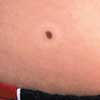Photoclinic: Halo Nevus
A 13-year-old girl noticed that the skin around a "mole" on her abdomen had gradually changed color. This patient was told that she had a halo nevus--a pigmented (nevocellular) nevus surrounded by a tight ring of depigmentation--which is benign and usually regresses spontaneously over time. This relatively common lesion is believed to affect males and females equally. The development of the halo may coincide with puberty or pregnancy. Often, several pigmented nevi develop a halo simultaneously.

A 13-year-old girl noticed that the skin around a "mole" on her abdomen had gradually changed color. This patient was told that she had a halo nevus--a pigmented (nevocellular) nevus surrounded by a tight ring of depigmentation--which is benign and usually regresses spontaneously over time. This relatively common lesion is believed to affect males and females equally. The development of the halo may coincide with puberty or pregnancy. Often, several pigmented nevi develop a halo simultaneously.
Although the pathogenesis is not completely understood, several investigators have suggested an immunological mechanism, including both an antibody and a cell-mediated phenomenon. Anti-melanocyte antibodies have been detected in patients with halo nevi as well as in those with vitiligo. In both conditions, increased numbers of antigen-presenting Langerhans cells have been identified in the depigmented ring. Halo nevi have often been found in persons with malignant melanoma. However, biopsy and referral to a dermatologist are indicated only for patients with lesions in which the central nevus demonstrates atypical features.
Uniform, symmetric features of the central nevus and the surrounding halo help distinguish acquired halo nevi from the irregular starburst halo phenomenon that occasionally appears around a melanoma. This phenomenon is also associated with congenital nevi, blue nevi, Spitz nevi, dysplastic nevi, and neurofibromas. An increased incidence of halo nevi has been reported in patients with vitiligo. A ring of hypopigmentation may appear around inflammatory dermatoses, such as psoriasis, lichen planus, and atopic dermatitis; however, the halo is not usually uniform with a crisp edge.
Recognize & Refer: Hemangiomas in pediatrics
July 17th 2019Contemporary Pediatrics sits down exclusively with Sheila Fallon Friedlander, MD, a professor dermatology and pediatrics, to discuss the one key condition for which she believes community pediatricians should be especially aware-hemangiomas.